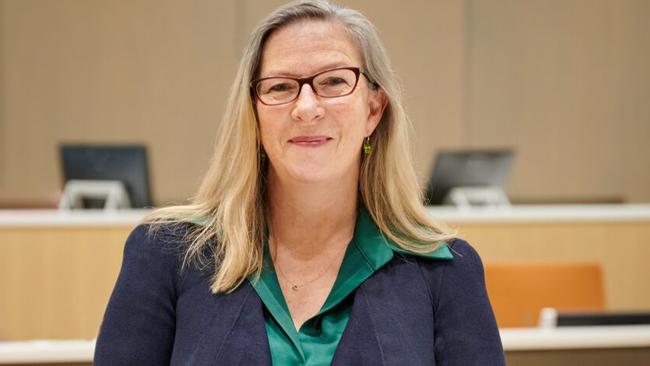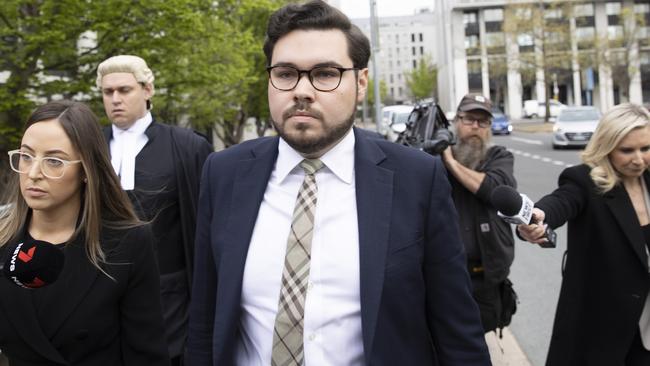‘Culture wars’ may impact rape case verdicts: chief judge
Lucy McCallum says ‘culture wars’ could be causing the acquittal of accused rapists, declaring she does not understand why jurors ‘find it so hard to believe’ sexual assault allegations.

The chief justice of the ACT Supreme Court has claimed that culture wars could be causing the acquittal of accused rapists, declaring she does not understand why jurors “find it so hard to believe” allegations of sexual assault and has a “feeling of unease” when it comes to how juries approach cases.
Chief Justice Lucy McCallum made what she described as “controversial” statements while calling on researchers to investigate juror decision-making in rape cases, sharpening her past critique of the way sexual assault complainants were treated in the territory.
Although she preceded the comments by saying juries always got the verdict right, the Chief Justice immediately bemoaned the way jurors approached sexual-assault cases, and questioned whether the impact of “traumatic” evidence contributed to verdicts.
She also revealed how she recently allowed jurors to access counselling services in the middle of a trial to discuss the “feelings that the evidence was evoking”.
The Chief Justice’s concerns, given in an address to the Jury Research and Practice Conference in Canberra on Friday, mark a rare intervention from the head of a jurisdiction over one of the key tenets of the justice system.
Her comments come amid growing tensions over how the courts handle rape allegations, with the Australian Law Reform Commission set to release a final report into justice responses to sexual violence in January.
A review into rape laws commissioned by the Albanese government and released last month praised a national shift towards affirmative-consent models that required less scrutiny of complainants in courts, and led to greater prosecutions of nuanced sexual violence cases.
But in NSW, some rape prosecutions have come under significant criticism from District Court judges for having too little evidence to secure a conviction.
This week, The Australian revealed senior silks were firmly opposing a “drastic” Victorian bill that would lead to the cross-examination of rape complainants being axed from the committal stage of a hearing.

During Friday’s conference, the Chief Justice said that since she had returned to Canberra from the NSW Supreme Court she had had “a feeling of unease about what juries make of allegations, particularly allegations of sexual assault”.
“For me, I want to understand why in the 2020s jurors find it so hard to believe allegations of sexual assault,” she said. “Now, I know that’s a controversial statement ... but it’s a sense that it’s just too much. I don’t know what the dynamics are there.”
Chief Justice McCallum, who presided over the aborted rape trial of political staffer Bruce Lehrmann, said that throughout her lengthy career on the bench she had only once experienced a trial where she thought the result was not right. Instead of an acquittal, she said she thought the accused should have been convicted. “So at least that was comforting ... at least if you abide by the principle (that it is) better for nine guilty men to walk free than one innocent man to be found guilty,” she said.
Despite these comments, the Chief Justice attempted to explore some reasons why jurors may struggle to believe complainants. “Is it the impact of culture wars in the states? Four years ago I barely understood what the expression meant; I am now well-immersed and well-versed in what culture wars mean,” she said. “Is it a sense of a jury doing what (former High Court judge Dyson) Heydon was referring to, of bringing their own view of what is morally fair, but in a very different social context?”
Her remarks followed an interview with the Canberra Times earlier this year in which she said the justice system could “do more” to strike a balance between conducting fair trials and evidence testing.
At the time, she said the “messaging” for rape complainants in the ACT was “we are entitled to think you might be lying until you prove that you’re not”.
Chief Justice McCallum said on Friday some jurors found the evidence of sexual-assault trials “extremely traumatic”, particularly in a digital age where there is much more evidence to be collected.
“What you now have (is) a download of Cellebrite records of incredibly graphic text exchanges between people who might or might not hook up, and then when they hook up, it ends up as an allegation of sexual assault,” she said.
“But the jurors are reading the text messages. They’re looking at videos ... young men are now videoing consent, or what they say is consent ... they’re videoing pornography. They’re keeping pornography. They’re sending pornography to the people that they want to have sex with.
“So jurors are exposed to all of this, and I sometimes wonder whether that is part of it, that it’s just all too much.”
The Chief Justice made reference to a recent case in which she received a message from the sheriff saying the jurors were not coping well with the evidence presented to them.
“The long story short is I said to the jury that they would have access to the counselling service which is available to the court, but of course gave them a further direction that they mustn’t discuss the facts with the counsellor but they could discuss ways to deal with trauma and deal with the feelings that the evidence was evoking,” she said.
Her decision to do so came after a WA judge allowed the jury similar measures in a particularly gruesome sexual assault case.
ACT Supreme Court judge Belinda Baker agreed steps should be taken by the courts to mitigate the impact of traumatic material on jurors.
“I do wonder whether ... things like videos to be shown to jurors immediately after empanelment, before we start delving into the traumatic material, about ‘how are you going’, ‘what are some coping mechanisms that you can adopt yourselves to deal with this traumatic material’, and ‘what should you do if you do find that it’s becoming too much’,” Justice Baker said.



